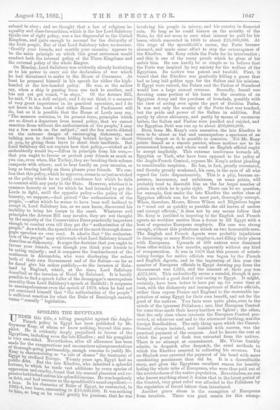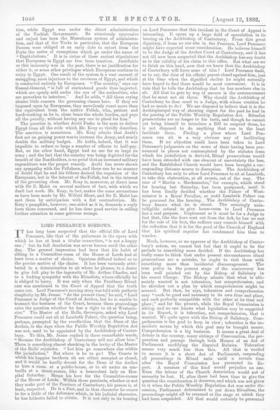SPOILING THE EGYPTIANS. -UNDER this title, a telling pamphlet against
the Anglo-
French policy in Egypt has been published by Mr. Seymour Keay, of whom we know nothing, beyond this pam- phlet. He is evidently deeply prejudiced in favour of the .Egyptians, including even the late Khedive; ; and his pamphlet is very one-sided. Nevertheless, after all allowance has been made for the exaggerations and unconscious misrepresentations of thorough-going partisanship, enough remains to justify Mr. Keay in characterising as "a tale of shame" the treatment of Egypt by civilised Europe. Twenty years ago, Egypt had no public debt. But the late Khedive, who inherited a splendid fortune, to which he made vast additions by every species of oppression and cruelty, found that his sensual pleasures and ex- pensive habits had outrun his splendid income, He was hopelessly in debt, and had recourse to the spendthrift's usual expedient,— a loan. In his character of Ruler of Egypt, he contracted, in 1862.-4, two loans, amounting to S10,000,000. It was nothing to hnn, so long as he could gratify his passions, that he was
involving his people in misery, and his country in financial ruin, So long as he could borrow on the security of the State, ho did not seem to care what interest he paid for his loans, which amounted in 1868 to about £25,000,000. At this stage of the spendthrift's career, the Porte became alarmed, and made some effort to stop the extravagance of the Khedive. Mr. Keay extols the Porte for its intervention ; and this is one of the many proofs which he gives of his unfair bias. He can hardly be so simple as to believe that the Porte was inspired by any anxiety for the welfare of the Egyptians. Its motive was patent and twofold. First, it feared that the Khedive was gradually killing a goose that had so long laid golden eggs for the Sultan and his minions. If Egypt were ruined, the Palace and the Pashas of Stamboul would lose a large annual revenue. Secondly, Ismail was devoting some portion of his loans to the creation of an Egyptian Army and the purchase of ironclads, possibly with the view of acting over again the part of Ibrahim Pasha. It was not only the avarice of the Porte that was touched, but the pride and power of the Sultan in addition. But partly by clever chicanery, and partly by moans of enormous bribes, the Sultan and Pashas were pacified and cajoled, and the Egyptian Debt was run up to about £90,000,000.
Even from Mr. Keay's own narrative, the late Khedive is seen to be about as bad and unscrupulous a specimen of an Oriental despot as it is possible to conceive. Yet Mr. Keay paints Ismail as a sincere patriot, whose motives are to be pronounced honest, and whose word an English official ought to accept implicitly. This extreme tenderness towards all, Egyptian or Turk, who have been opposed to the policy of the Anglo-French Control, exposes Mr. Keay's ardent pleading to considerable suspicion. He has, in fact, greatly overstated, and thereby greatly weakened, his case, in the eyes of all who regard the facts dispassionately. This is a pity, because ex- posures, inaccuracy, and unfairness, on some points, will probably tend to discredit him on the far larger number of points on which he is quite right. There can be no question, for example, that under the late Khedive the entire class of Egyptian officials was, for the most part, thoroughly corrupt. When, therefore, Messrs, Rivers Wilson and Blignieres began to " weed out as quickly as possible the old leaven of useless and corrupt officials," it does not by any means follow that Mr. Keay is justified in imputing to the English and French agents no worthier motive than a desire to fill Egypt with a host of expensive European employ6s. His case was strong enough, without this gratuitous attack on two honourable men. The English and French Agents were probably injudicious in dismissing so many Native employ6s, and filling their places with Europeans. Upwards of 500 natives were dismissed from office within a few months, apparently without any kind of compensation. It was in 1878 that this process of substi- tuting foreign for native officials was begun by the French and English Agents, and in the beginning of this year the number of European officials in Egypt drawing pay from the Government was 1,325, and the amount of their pay was £373,000. This undoubtedly seems a scandal, though it pro- bably involved a good deal of real saving to Egypt. It might, certainly, have been better to have put up, for some time at least, with the dishonesty and incompetence of Native officials, rather than expose France and England to the reasonable im- putation of using Egypt for their own benefit, and not for the good of the natives. Two facts were quite plain, even to the minds of the ignorant Fellaheen ; one, that European Control for some time made their heavy burthen no lighter ; the other, that the only class whose interests the European Control pro- tected, at whatever cost and to the uttermost farthing, was the foreign Bondholders. The only thing upon which the Consul- General always insisted, and insisted with success, was the punctual payment of the coupons. And he knows the cost at which the pound of flesh was extracted from the natives. There is no attempt at concealment. Mr. Vivian frankly admits, in despatch after despatch, the cruel methods to which the Khedive resorted in collecting his revenue. Yet no Shylock ever extorted the payment of his bond with more unrelenting persistence than did he. It is a discreditable story, and gives the Egyptians excellent reason for heartily hating the whole tribe of Europeans, who were thus paid out of the wretchedness of the native population. Nevertheless, no one who knows anything about it denies that in the latest period of the Control, very great relief was afforded to the Fellaheen by the regulation of forced labour then introduced.
Another grave abuse is the exemption of Europeans from taxation. There was good reason for this exemp- tion, while Egypt was under the direct administration
of the Turkish Government. So atrociously oppressive and unjust has been the Mussulman system of administra- tion, and that of the Turks in particular, that the European Powers were obliged at an early date to extort from the Porte the series of exemptions which go under the name of " Capitulations." It is in virtue of these ancient stipulations that Europeans in Egypt are free from taxation. Justifiable as this immunity was in the past, there is no justification for either it, or some other privileges which Europeans continue to enjoy in Egypt. One result of the system is a vast amount of smuggling, most injurious to the revenues of Egypt, and which is conducted entirely by Europeans. " The country," says our Consul-General, " is full of contraband goods thus imported, which are openly sold under the eye of the authorities, who are powerless to interfere." And he adds, " All these crying abuses little concern the governing classes here. If they are imposed upon by Europeans, they mercilessly exact more than the equivalent from the native Fellah, who, patient and hard-working as he is, alone bears the whole burden, and pays all the penalty, without having any one to plead for him."
The question is, whether Arabi Pasha is the man to deliver Egypt from all the evils which Mr. Keay so vividly describes. The assertion is monstrous. Mr. Keay admits that Arabi's first act on gaining power was to increase the Army, and nearly double the military budget. He holds, indeed, that it was impolitic to reduce so large a number of officers to half-pay. But, on the other hand, Egypt had no use for so large an army ; and the fact that the country was being depleted for the benefit of the Bondholders, is no proof that an increased military expenditure was the proper remedy. Arabi has never shown any sympathy with the Fellaheen, and there can be no manner of doubt that he and his fellows desired the expulsion of the Europeans, not in the interest of the Fellah, but in the interest of the governing class. Mr. Keay is, moreover, at direct issue with Sir E. Malet on several matters of fact, with which we dealt last week. Mr. Keay, in fact, makes the same accusations as have been made by Mr. Wilfrid Blunt, and Sir E. Malet has met them by anticipation with a flat contradiction. Mr. Keay's pamphlet, however, one-sided as it is, demands a reply from those concerned, and he has done good service in calling further attention to some grievous wrongs.































 Previous page
Previous page